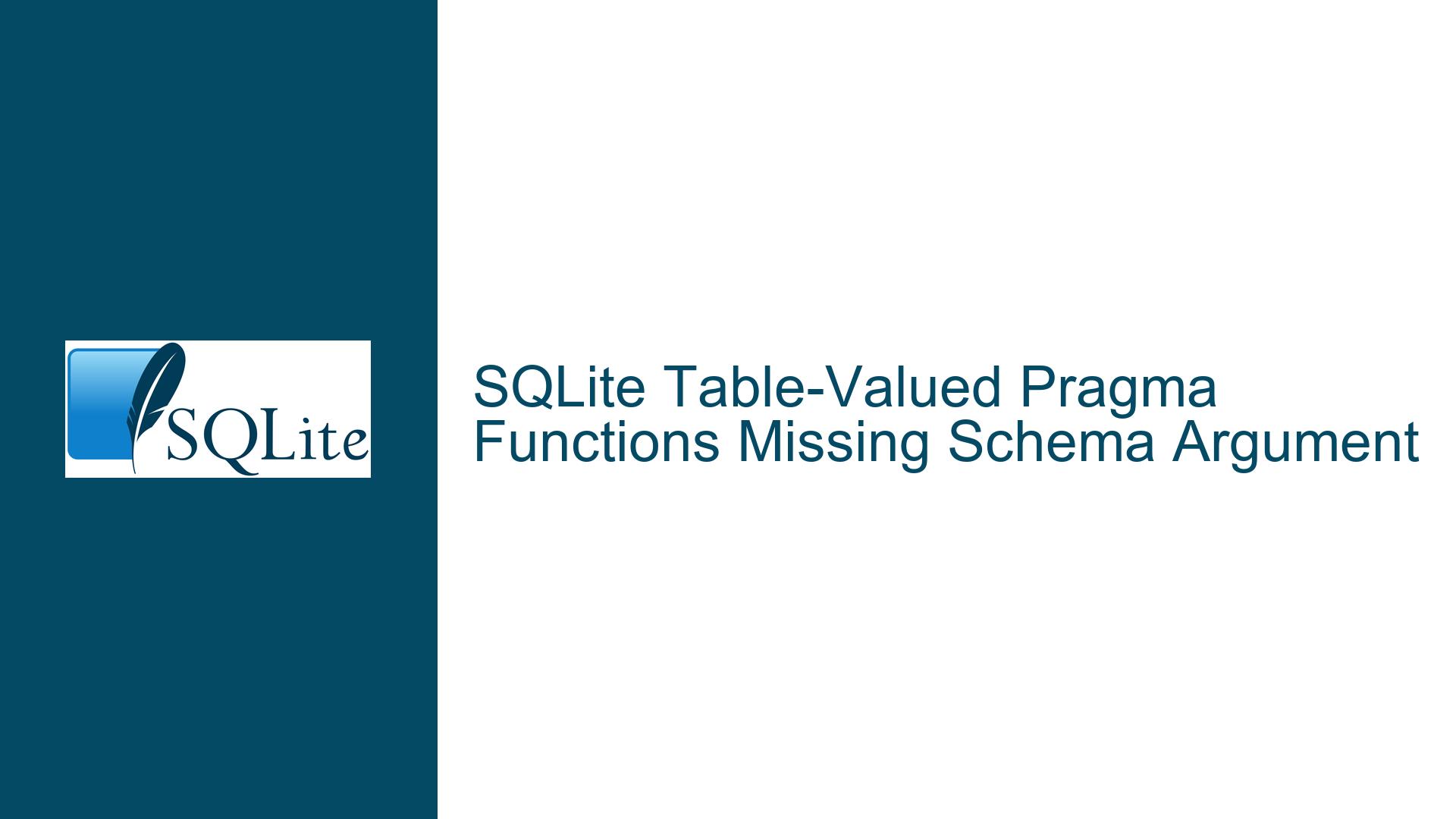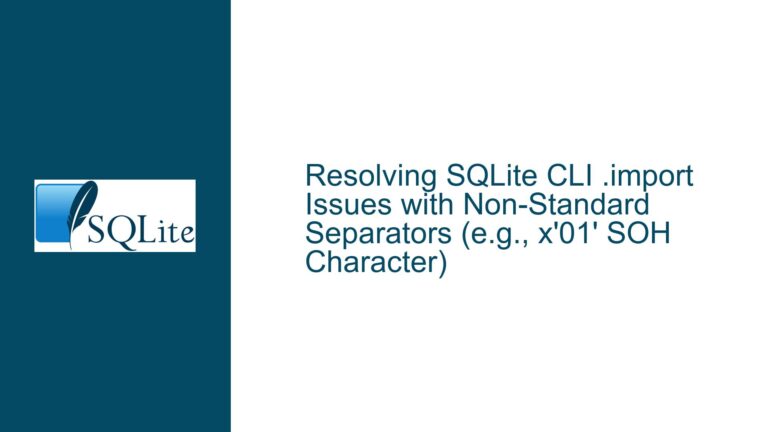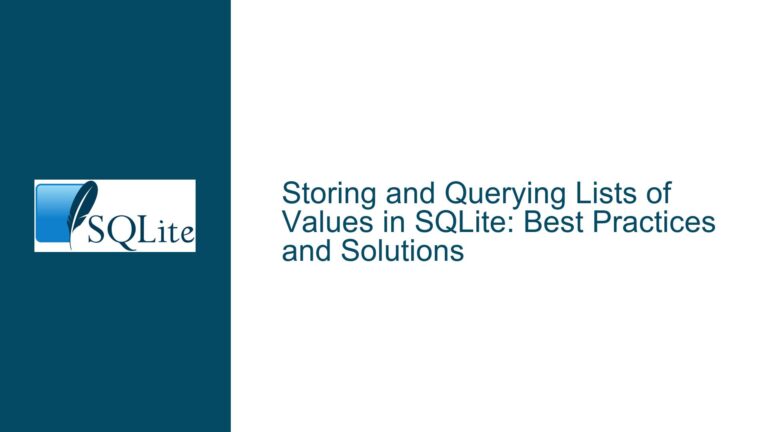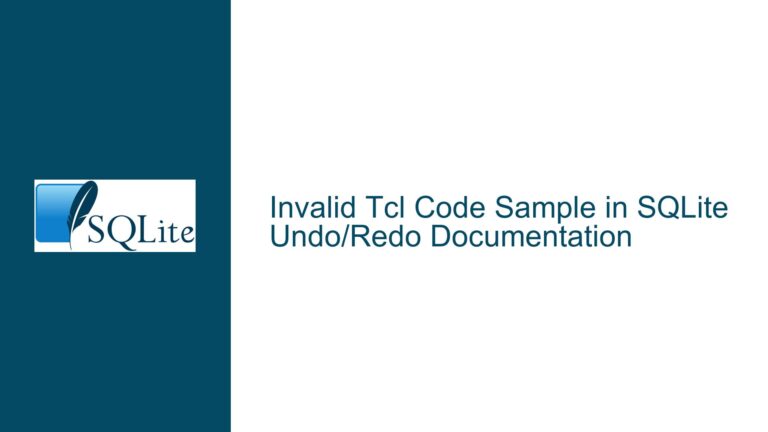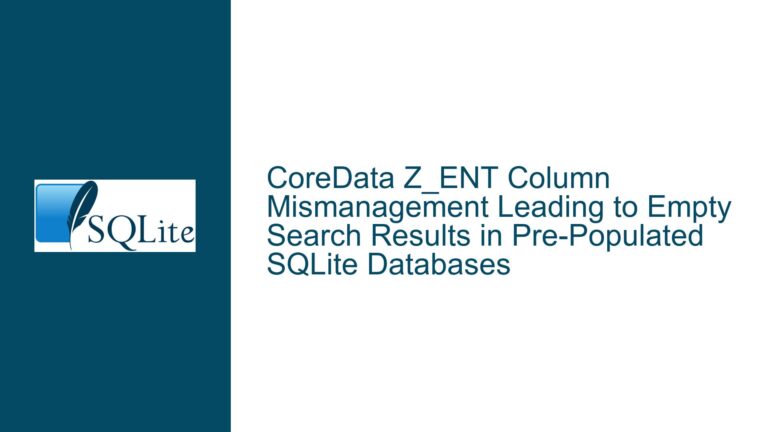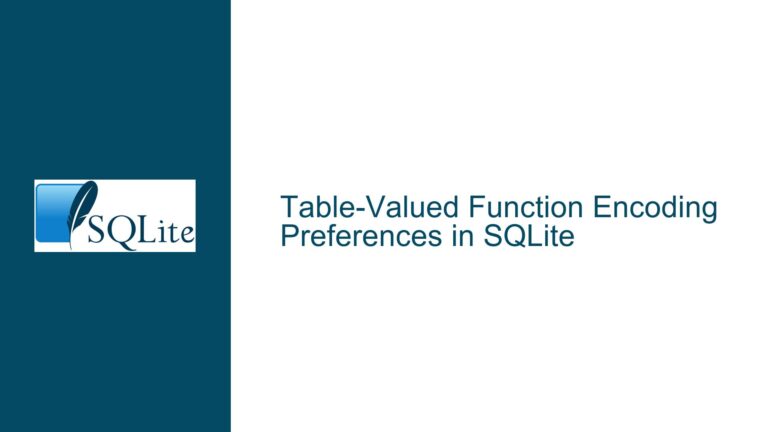SQLite Table-Valued Pragma Functions Missing Schema Argument
Issue Overview: Table-Valued Pragma Functions Lack Schema Argument Support
In SQLite, pragma functions are special commands used to query or modify the internal operations of the database. These functions are often used to retrieve metadata, configure settings, or optimize database performance. A subset of these pragma functions, known as table-valued pragma functions, return their results in a tabular format, making them particularly useful for programmatic access and integration with SQL queries. However, a critical issue has been identified where several table-valued pragma functions do not support the schema argument, despite their corresponding pragma commands accepting a schema name.
The affected table-valued pragma functions include:
pragma_application_idpragma_data_versionpragma_freelist_countpragma_optimizepragma_schema_versionpragma_secure_deletepragma_user_version
The absence of the schema argument in these functions limits their usability in multi-schema environments, where operations often need to be scoped to a specific schema. For example, if a database contains multiple attached schemas, a user might want to query the user_version of a specific schema using pragma_user_version. However, the current implementation does not allow this, as the function lacks the ability to specify a schema.
This issue stems from a missing flag (SchemaReq) in the mkpragmatab.tcl script, which is responsible for generating the pragma function definitions. The SchemaReq flag indicates that a pragma function requires a schema argument. Without this flag, the generated functions do not include the necessary logic to handle schema-specific operations.
Possible Causes: Missing SchemaReq Flag in mkpragmatab.tcl
The root cause of this issue lies in the mkpragmatab.tcl script, which is used to generate the pragma function definitions in SQLite. This script defines various properties for each pragma, including its name, type, arguments, and flags. One of these flags, SchemaReq, is used to indicate that a pragma function requires a schema argument. However, this flag is missing from the definitions of the affected table-valued pragma functions.
The SchemaReq flag serves two primary purposes:
- It ensures that the generated pragma function includes a schema argument in its signature.
- It enables the function to scope its operations to the specified schema, allowing for schema-specific queries and modifications.
The absence of the SchemaReq flag in the definitions of the affected functions means that they are generated without the necessary schema argument. As a result, these functions cannot be used to perform schema-specific operations, even though their corresponding pragma commands support schema names.
For example, consider the pragma_user_version function. The corresponding PRAGMA user_version command accepts a schema name, allowing users to query or modify the user_version of a specific schema. However, the pragma_user_version function does not include a schema argument, making it impossible to perform schema-specific operations using this function.
The missing SchemaReq flag is a result of an oversight in the mkpragmatab.tcl script. The script defines the flags for each pragma function, but the SchemaReq flag was not included in the definitions of the affected functions. This oversight was identified and corrected by adding the SchemaReq flag to the relevant entries in the script.
Troubleshooting Steps, Solutions & Fixes: Adding SchemaReq Flag to Affected Pragma Functions
To resolve the issue of missing schema argument support in table-valued pragma functions, the SchemaReq flag must be added to the definitions of the affected functions in the mkpragmatab.tcl script. This involves modifying the script to include the SchemaReq flag in the appropriate entries, ensuring that the generated functions include the necessary schema argument.
The following steps outline the process of adding the SchemaReq flag to the affected pragma functions:
Identify the Affected Functions: The first step is to identify the table-valued pragma functions that are missing the
SchemaReqflag. These functions includepragma_application_id,pragma_data_version,pragma_freelist_count,pragma_optimize,pragma_schema_version,pragma_secure_delete, andpragma_user_version.Locate the Definitions in mkpragmatab.tcl: The next step is to locate the definitions of the affected functions in the
mkpragmatab.tclscript. These definitions are typically grouped by category, such as pager-related pragmas, schema version pragmas, and optimization pragmas.Add the SchemaReq Flag: Once the definitions have been located, the
SchemaReqflag must be added to theFLAGproperty of each affected function. This ensures that the generated functions include the necessary schema argument.Verify the Changes: After modifying the script, it is important to verify that the changes have been applied correctly. This can be done by regenerating the pragma function definitions and inspecting the generated code to ensure that the
SchemaReqflag has been included.Test the Updated Functions: Finally, the updated functions should be tested to ensure that they now support the schema argument. This involves creating a multi-schema database, attaching multiple schemas, and using the updated functions to perform schema-specific operations.
The following is an example of how the mkpragmatab.tcl script should be modified to add the SchemaReq flag to the affected functions:
# Original definition of pragma_secure_delete
NAME: secure_delete
FLAG: Result0
IF: !defined(SQLITE_OMIT_PAGER_PRAGMAS)
# Modified definition of pragma_secure_delete
NAME: secure_delete
FLAG: Result0 SchemaReq
IF: !defined(SQLITE_OMIT_PAGER_PRAGMAS)
# Original definition of pragma_schema_version
NAME: schema_version
TYPE: HEADER_VALUE
ARG: BTREE_SCHEMA_VERSION
FLAG: NoColumns1 Result0
IF: !defined(SQLITE_OMIT_SCHEMA_VERSION_PRAGMAS)
# Modified definition of pragma_schema_version
NAME: schema_version
TYPE: HEADER_VALUE
ARG: BTREE_SCHEMA_VERSION
FLAG: NoColumns1 Result0 SchemaReq
IF: !defined(SQLITE_OMIT_SCHEMA_VERSION_PRAGMAS)
# Original definition of pragma_user_version
NAME: user_version
TYPE: HEADER_VALUE
ARG: BTREE_USER_VERSION
FLAG: NoColumns1 Result0
IF: !defined(SQLITE_OMIT_SCHEMA_VERSION_PRAGMAS)
# Modified definition of pragma_user_version
NAME: user_version
TYPE: HEADER_VALUE
ARG: BTREE_USER_VERSION
FLAG: NoColumns1 Result0 SchemaReq
IF: !defined(SQLITE_OMIT_SCHEMA_VERSION_PRAGMAS)
# Original definition of pragma_data_version
NAME: data_version
TYPE: HEADER_VALUE
ARG: BTREE_DATA_VERSION|PRAGMA_HEADER_VALUE_READONLY
FLAG: Result0
IF: !defined(SQLITE_OMIT_SCHEMA_VERSION_PRAGMAS)
# Modified definition of pragma_data_version
NAME: data_version
TYPE: HEADER_VALUE
ARG: BTREE_DATA_VERSION|PRAGMA_HEADER_VALUE_READONLY
FLAG: Result0 SchemaReq
IF: !defined(SQLITE_OMIT_SCHEMA_VERSION_PRAGMAS)
# Original definition of pragma_freelist_count
NAME: freelist_count
TYPE: HEADER_VALUE
ARG: BTREE_FREE_PAGE_COUNT|PRAGMA_HEADER_VALUE_READONLY
FLAG: Result0
IF: !defined(SQLITE_OMIT_SCHEMA_VERSION_PRAGMAS)
# Modified definition of pragma_freelist_count
NAME: freelist_count
TYPE: HEADER_VALUE
ARG: BTREE_FREE_PAGE_COUNT|PRAGMA_HEADER_VALUE_READONLY
FLAG: Result0 SchemaReq
IF: !defined(SQLITE_OMIT_SCHEMA_VERSION_PRAGMAS)
# Original definition of pragma_application_id
NAME: application_id
TYPE: HEADER_VALUE
ARG: BTREE_APPLICATION_ID
FLAG: NoColumns1 Result0
IF: !defined(SQLITE_OMIT_SCHEMA_VERSION_PRAGMAS)
# Modified definition of pragma_application_id
NAME: application_id
TYPE: HEADER_VALUE
ARG: BTREE_APPLICATION_ID
FLAG: NoColumns1 Result0 SchemaReq
IF: !defined(SQLITE_OMIT_SCHEMA_VERSION_PRAGMAS)
# Original definition of pragma_optimize
NAME: optimize
FLAG: Result1 NeedSchema
IF: !defined(SQLITE_OMIT_OPTIMIZATION_PRAGMAS)
# Modified definition of pragma_optimize
NAME: optimize
FLAG: Result1 NeedSchema SchemaReq
IF: !defined(SQLITE_OMIT_OPTIMIZATION_PRAGMAS)
By adding the SchemaReq flag to the definitions of the affected functions, the generated pragma functions will now include the necessary schema argument, allowing them to be used in multi-schema environments. This ensures that users can perform schema-specific operations using these functions, just as they would with the corresponding pragma commands.
In conclusion, the issue of missing schema argument support in table-valued pragma functions can be resolved by adding the SchemaReq flag to the definitions of the affected functions in the mkpragmatab.tcl script. This modification ensures that the generated functions include the necessary schema argument, enabling schema-specific operations in multi-schema environments. By following the outlined steps, developers can address this issue and ensure that their SQLite databases are fully functional and versatile.
